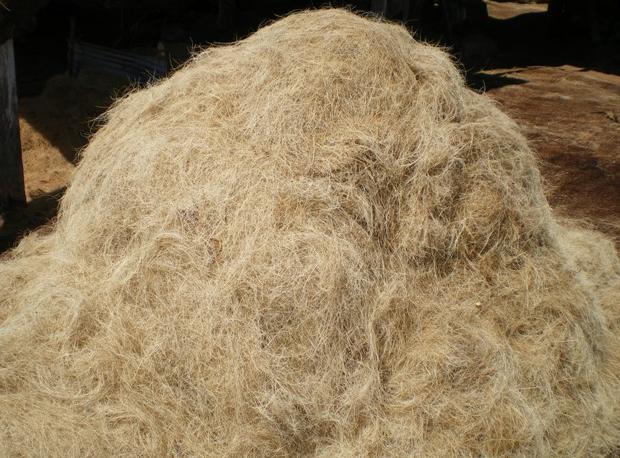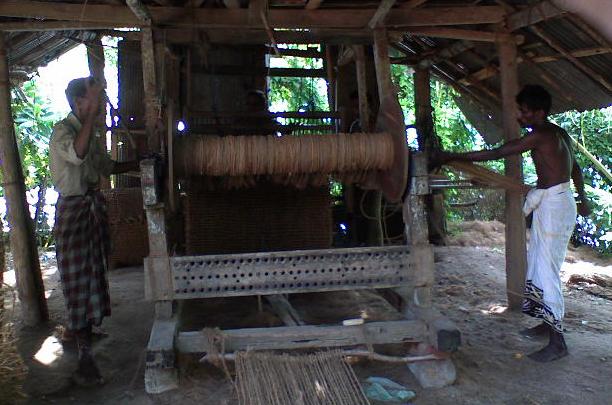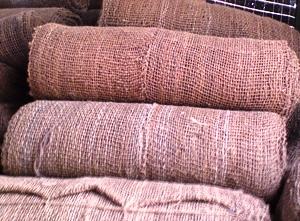|
AGRO BASED INDUSTRIES
Coconut based products
According to the Coir Board, Tamilnadu stands first in the production of brown coir fibre in the country, accounting for 43 %, but its focus on value added products is almost nil. Dharmapuri has a sizeable area, accounting for nearly 7 % of the area in the state, under coconut cultivation.
Area under Coconut cultivation - 20,472 hectares.
Total Production of coconuts - 3,741 lakh nuts
Average production per hectare - 10,204 nuts.
There is good scope for industrial activity based on coconut and waste material like husk and pith from coconut.
Coir based industry offers enormous employment opportunities. There is a vast market both domestically as well as internationally, for coconut-based products.
The Coir Board grants financial assistance upto 25 percent of the cost of equipment and infrastructure facilities with a ceiling of Rs.1 lakh for setting up new Fibre/spinning rope and Matting / Rubberised coir unit in the private sector. Interested persons can contact the Coir Board at the following addresses for technical advice/availing of various schemes.
- The Regional Office Coir Board, 110, Murugappa Complex, Palakkad Rd, Pollachi - 642001.
- The Regional Coir Training & Development Centre Coir Board Pillayarpatti, Vallam (Via), Thanjavur - 613403.
Manure based on Coir Pith
 |
 |
| Raw coir pith |
Composted coir pith |
Coir pith can be converted into organic manure. The process takes a month’s time. Scientists at the Coir board, Central Coir Research Institute, Alleppey and Tamilnadu Agricultural University, Coimbatore using a formulation called “Pith Plus”, develop the technology jointly. To process one tonne of coir pith, two Kgs. of pith plus and five Kgs of urea are needed.
The process essentially consists of repeatedly sandwiching uniform layers of pith plus, urea and coir pith in a fixed ratio of 100 Kgs of coir pith, 400 grams of pith plus and one kg of urea until the heap reaches the height of one meter. Water should be sprinkled if the moisture content of the pith falls below 200 per cent.
At the end of 30 days, the coir pith turns into black mass of compost with carbon & nitrogen ratio of 24 : 1, which is recommended as an ideal organic manure.
Coir Geo-Textile
 |
 |
 |
Raw Coir |
Spinning |
Coir mat |
Soil erosion is a grave problem for the humankind. It is reported that 18% of the topsoil is being eroded every year all over the world. It has been established that coir netting is an ideal material for prevention of soil erosion through wind, rainfall and other natural calamities.
Being a biodegradable material, coir has increasing demand as geo-textiles in European markets. Jute, which is the main substitute to coir, has comparatively lower strength. Hence, coir is preferred in long slopes and canals with high velocity of water. Other applications of geo-textile are soil stabilisation, soil reinforcement, road pavements, drainage filter etc. The global demand for geo-textiles is 1400 million square meters. Present contribution from the Indian coir sector is hardly two per cent. It was reported that 474 MTs of coir geo-textiles valued at Rs. 1.7 Crores were annually exported from India.
As Dharmapuri district has a sizeable area under Coconut cultivation, there is good scope for geo-textile manufacturing units in the district.
Polycoir
Polycoir is an alternative to wood. It is the composite material of coir and polymer. It finds application in construction and consumer industries. It can be used for manufacture of furniture, door shutters, panelling etc. The Central Coir Research Institute of the coir Board in collaboration with the Regional Research Laboratory (RRL) Thiruvananthapuram has developed Polycoir out of brown fibers of coconut.
The coir fibre is cut into appropriate width and coated with the desired quantity of phenol formaldehyde resin. Then it is converted into sheets by press moulding. The sheets are cut into required size and stacked one over the other. The number of layers used is decided on the requirements of thickness of the component. Then edges are trimmed and polished. The main advantages of Polycoir over plywood are:
1. Termite Proof
2. Water Resistant
3. Fire Resistant
4. Can be moulded in desired shape
5. Good aesthetic appeal
Minimum Economic Unit size: 2.5 tonnes / day
Technology Source: Regional Research Laboratory, Trivandrum.
Coconut husk particle board
The coconut husk can be used for manufacture of particleboard, which is a substitute to plywood. It is used for partitioning, false roofing and paneling.
The coconut husk has self-bonding property and so boards can be made using 0.5 % adhesive only. The husk is cut and the pieces beaten by a wooden mallet and shredded. The shreds are dried and coated with phenol formaldehyde resin, formed into mats and pressed at 150-Degree Centigrade at 10 Kg/sq. cm for 30 min. to get 20-mm thick boards.
Minimum Economic Unit size : 12 tonnes/day
Indicative Investment : Rs. 24 lakh
Technology Source: Central Building Research Institute, Roorkee.
Desiccated coconut
Another coconut-based industry that can come up in the district is the manufacture of desiccated coconut. The coconut production in the district is estimated as 3741 lakh numbers. Viewed in this background and also the wide application of desiccated coconut in bakery, confectionery and betelnut units, there is high scope for the product. Some units can be set up at Hosur Dharmapuri and Krishnagiri blocks.
Minimum Economic Unit size : 2000 tonnes/Annum
Indicative Investment : Rs. 25 lakh
Technology Source : CFTRI, Mysore.
Composite unit for manufacture of Other Coconut based Products :
The following value added products can also be manufactured using coconut products and waste in a composite unit:
- Coconut Shell Cups as Ice cream cups
- Coconut Shell Charcoal
- Coir Moulded Baskets
- Coir Bristle Fibre for brushes
- Cut coir
- Coir Yarn
- Coir mats
- Coir Matting with or without latex backing
- Coir carpets
- Coir rugs
- Coir bricks
Minimum Economic Unit size : 10 tonnes/day
Indicative Investment : Rs. 25 lakh
|
|





